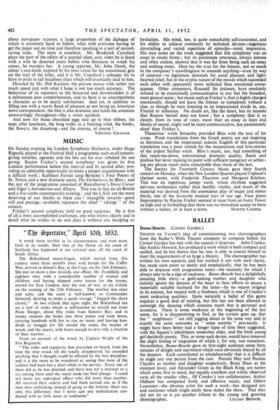MUSIC
ON Sunday evening the London Symphony Orchestra, under Hugo Rignold, played at the Festival Hall a programme such as all concert- giving societies, agencies and the like are for ever rebuked for not giving. Racine Fricker's second symphony was given its first London performance before the interval and its second after, pro- viding an admirable opportunity to make a proper acquaintance with a difficult work ; Kathleen Ferrier sang Berkeley's Four Poems of St. Teresa and a new dramatic scena, The Enchantress, by Bliss ; and the rest of the programme consisted of Rawsthorne's Street Corner and Elgar's Introduction and Allegro. This was in fact an all-British and a five-sixths contemporary evening ; and the L.S.O. are the more deserving of our thanks as these alas ! intangible rewards—good will and prestige—probably represent the chief " takings" of the concert.
Fricker's second symphony held no great surprises. He is first of all a most accomplished craftsman, one who knows clearly and in detail what he wishes to do and does it without any bungling or hesitation. His mind, too, is quite remarkably self-consistent, and his ability to achieve continuity by technical devices—ingenious dovetailing and varied repetition of episodes—most impressive. His own notes on the work suggested that this symphony was an essay in rondo forms ; but its passionate utterance, always intense and often violent, showed that it was far from being such an essay and nothing more. Here lay the crux for the listener, not so much in the composer's unwillingness to concede anything—even by way of contrast—to legitimate demands for aural pleasure and light- hearted relief, but in the cryptic nature of the moods which succeeded each other with apparently more technical than emotional conse- quence. Other composers, Roussell for instance, have resolutely refused to be emotionally communicative in any but the broadest, most general sense ; but music such as Fricker's, that is highly charged emotionally, should not leave the listener so completely without a clue, as though he were listening to an impassioned tirade in, say, Finnish or Albanian. No doubt art, like the heart, has its reasons that Reason herself does not khow ; but a symphony that is so clearly, from its tone of voice, more than an essay in lines and blocks of sound, might well be more communicative, less passionately aloof than Pricker 's.
Theocritus' witch Simaetha provided Bliss with the text of his scena. Prose translations from the Greek poetry are not inspiring as literature, and the impersonal, eclectic English of this particular translation was a poor vehicle for the incantations and love-storms of the ardent Sicilian witch. Bliss's music, too, had something of this reach-me-down, Conventional dramatic quality, fluent and profuse but never making its point with sufficient pungency or achiev- ing any phrase much more remarkable than those of the text.
The Society for Twentieth Century Music gave their fourth concert on Monday, when the New London Quartet played Copland's clarinet sextet, with Frederick Thurston and Margaret Kitchen. This was an ingenious, jumpy work, whose rhythms suggested nervous restlessness rather than healthy vitality, and much of the material was derived from the anomalous play of major and minor thirds, one of the favourite musical toys of our age. Four piano Impromptus by Racine Fricker seemed to issue from an Ivory Tower so high and so forbidding that there was no immediate access to them without a ladder, or at least a score. MARTIN COOPER.


































 Previous page
Previous page